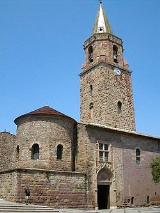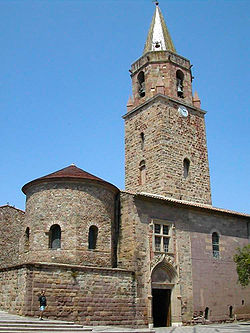
Leontius of Fréjus
Encyclopedia
Saint Leontius (ca. 419 – ca. 488) was a bishop of Fréjus, in Provence
. He was born probably at Nîmes
, towards the end of the fourth century; he died in his episcopal town in 488, according to some authorities, though others say 443 or even 448. His feast day
is December 1.
The date of his Episcopal
ordination is uncertain, but most likely it took place between the years 400 and 419; indeed the obscurity surrounding his life has not been entirely dissipated by the most conscientious labours of historians. It is however, indisputable that he was a man of eminent sanctity, and his episcopate was marked with important results, else he would not have been from an early date associated with the Blessed Virgin as patron of the cathedral church of Fréjus.
A tenth-century document mentions him in this connection. There is reason to believe that he was a brother of St. Castor
, Bishop of Apt, and that consequently like him he was a native of Nîmes. At times he has been mistaken for other persons of the same name, especially for Leontius, Bishop of Arles, who lived at the end of the fifth century. But besides the difference in time, the important events associated with the name of the latter Leontius render the identification impossible.
 The principal occurrence during the episcopate of Leontius of Fréjus was the establishment of the monastery of Lerins at the beginning of the fifth century. The name of this bishop is inseparably united to that of Honoratus
The principal occurrence during the episcopate of Leontius of Fréjus was the establishment of the monastery of Lerins at the beginning of the fifth century. The name of this bishop is inseparably united to that of Honoratus
, the founder of the monastery, and he seems to have played an important part in the development of the monastic life in the south-east of Gaul. Honoratus called him his superior and his father, whilst John Cassian who governed the numerous religious of the Abbey of St. Victor at Marseilles, dedicated most of his "Conferences" to him.
The relations of the monastery of Lérins to the diocesan bishop were most cordial and liberal. Some writers believe that this was due merely to the common custom of the age, but others hold, and not without reason it would seem, that it was the result of special privileges granted by Leontius to Honoratus, with whom he was intimately united in the bonds of friendship. Be that as it may, these regulations, which, while safeguarding the episcopal dignity, assured the independence of the monastery, and were confirmed by the Third Council of Arles, seem to have been the beginning of those immunities which hence-forward were enjoyed in an increasing degree by the religious communities.
, and bestowed them on Leontius. It is true that this important event took place only in 445, whilst Leontius had been succeeded in the episcopate by Theodore in 433. That is why some authorities have held that these prerogatives were granted to another Bishop of Fréjus, likewise named Leontius, who would have been a successor of Theodore.
To this the supporters of a loved tradition reply that St. Leontius abandoned his see in 432 to go and preach the Gospel to the Teutonic
tribes, and returned to his diocese in 442 dying only in 445 or even 448. Unfortunately no very solid proof of this apostolate can he adduced. Consequently it is still quite uncertain whether or not the Diocese of Fréjus had more than one bishop called Leontius. Another tradition, making St. Leontius a martyr, does not seem older than the beginning of the thirteenth century, and merits no credence. Earlier and better authenticated documents give him the title of confessor
, which alone is accurate.
Provence
Provence ; Provençal: Provença in classical norm or Prouvènço in Mistralian norm) is a region of south eastern France on the Mediterranean adjacent to Italy. It is part of the administrative région of Provence-Alpes-Côte d'Azur...
. He was born probably at Nîmes
Nîmes
Nîmes is the capital of the Gard department in the Languedoc-Roussillon region in southern France. Nîmes has a rich history, dating back to the Roman Empire, and is a popular tourist destination.-History:...
, towards the end of the fourth century; he died in his episcopal town in 488, according to some authorities, though others say 443 or even 448. His feast day
Calendar of saints
The calendar of saints is a traditional Christian method of organizing a liturgical year by associating each day with one or more saints and referring to the feast day of said saint...
is December 1.
The date of his Episcopal
Episcopal polity
Episcopal polity is a form of church governance that is hierarchical in structure with the chief authority over a local Christian church resting in a bishop...
ordination is uncertain, but most likely it took place between the years 400 and 419; indeed the obscurity surrounding his life has not been entirely dissipated by the most conscientious labours of historians. It is however, indisputable that he was a man of eminent sanctity, and his episcopate was marked with important results, else he would not have been from an early date associated with the Blessed Virgin as patron of the cathedral church of Fréjus.
A tenth-century document mentions him in this connection. There is reason to believe that he was a brother of St. Castor
Castor of Apt
Saint Castor of Apt was a bishop of Apt, in Gaul.He was born in Nîmes and may have been the brother of Saint Leontius of Fréjus. Castor was a lawyer and married to a wealthy widow. He lived in Marseilles. His wife, however, allowed him to enter the religious life; she herself entered a nunnery....
, Bishop of Apt, and that consequently like him he was a native of Nîmes. At times he has been mistaken for other persons of the same name, especially for Leontius, Bishop of Arles, who lived at the end of the fifth century. But besides the difference in time, the important events associated with the name of the latter Leontius render the identification impossible.
Episcopate

Honoratus
Saint Honoratus was Archbishop of Arles.There is some disagreement concerning his place of birth, and the date of his death is still disputed, being according to certain authors, January 14 or January 15. It is believed that he was born in the north of Gaul and that he belonged to an illustrious...
, the founder of the monastery, and he seems to have played an important part in the development of the monastic life in the south-east of Gaul. Honoratus called him his superior and his father, whilst John Cassian who governed the numerous religious of the Abbey of St. Victor at Marseilles, dedicated most of his "Conferences" to him.
The relations of the monastery of Lérins to the diocesan bishop were most cordial and liberal. Some writers believe that this was due merely to the common custom of the age, but others hold, and not without reason it would seem, that it was the result of special privileges granted by Leontius to Honoratus, with whom he was intimately united in the bonds of friendship. Be that as it may, these regulations, which, while safeguarding the episcopal dignity, assured the independence of the monastery, and were confirmed by the Third Council of Arles, seem to have been the beginning of those immunities which hence-forward were enjoyed in an increasing degree by the religious communities.
Relationship with papacy
Moreover, the most cordial relations existed between the saint and the sovereign pontiffs. This is proved by the fact that St. Leo I, after his memorable quarrel with St. Honoratus, Bishop of Arles, deprived the latter of the prerogatives which gave him a kind of primacy over the district of VienneVienne
Vienne is the northernmost département of the Poitou-Charentes region of France, named after the river Vienne.- Viennese history :Vienne is one of the original 83 departments, established on March 4, 1790 during the French Revolution. It was created from parts of the former provinces of Poitou,...
, and bestowed them on Leontius. It is true that this important event took place only in 445, whilst Leontius had been succeeded in the episcopate by Theodore in 433. That is why some authorities have held that these prerogatives were granted to another Bishop of Fréjus, likewise named Leontius, who would have been a successor of Theodore.
To this the supporters of a loved tradition reply that St. Leontius abandoned his see in 432 to go and preach the Gospel to the Teutonic
Teutons
The Teutons or Teutones were mentioned as a Germanic tribe by Greek and Roman authors, notably Strabo and Marcus Velleius Paterculus and normally in close connection with the Cimbri, whose ethnicity is contested between Gauls and Germani...
tribes, and returned to his diocese in 442 dying only in 445 or even 448. Unfortunately no very solid proof of this apostolate can he adduced. Consequently it is still quite uncertain whether or not the Diocese of Fréjus had more than one bishop called Leontius. Another tradition, making St. Leontius a martyr, does not seem older than the beginning of the thirteenth century, and merits no credence. Earlier and better authenticated documents give him the title of confessor
Confessor
-Confessor of the Faith:Its oldest use is to indicate a saint who has suffered persecution and torture for the faith, but not to the point of death. The term is still used in this way in the East. In Latin Christianity it has come to signify any saint, as well as those who have been declared...
, which alone is accurate.
External links
- Leontius at the Catholic EncyclopediaCatholic EncyclopediaThe Catholic Encyclopedia, also referred to as the Old Catholic Encyclopedia and the Original Catholic Encyclopedia, is an English-language encyclopedia published in the United States. The first volume appeared in March 1907 and the last three volumes appeared in 1912, followed by a master index...

